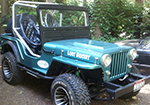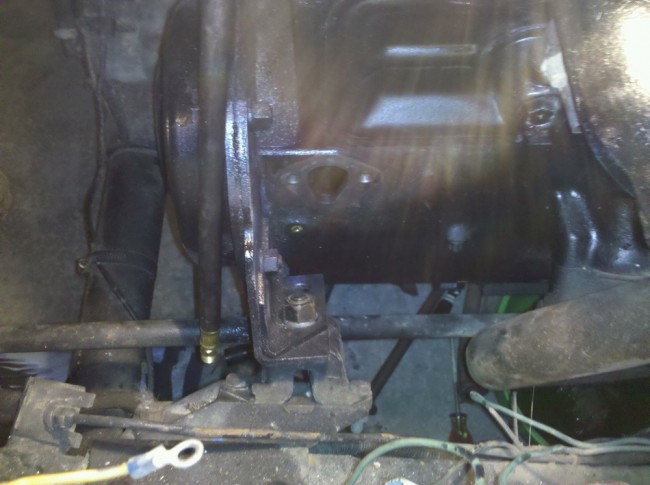Well, we all eventually arrive at one of these places where the unexpected happens, inevitably followed by the ‘what do I do now’ question. That’s where James is at and he needs a few suggestions. You might remember James from when I visited his father and him in Denver back in October.
“I was replacing the old inlet oil line into the engine (below the fuel pump). I was loosening the oil line that went into the 90 degree brass fitting oil line bracket (Walck4wd part number 384569) and accidently torqued the bracket. The fuel line came off, but the thread from the 90 degree brass fitting oil line bracket broke off inside the engine in the oil inlet. Great.. So, I bought an extractor from Sears and have been trying to extract the remaining thread left inside the oil inlet (below the fuel pump) with no luck. There is hardly any room to hammer the extractor into the block. So now here I am, stuck. Any idea how to remove the remaining thread? Thanks, James DeBartolomeis”
Here’s a pic:



I had the same thing happen on one of my restorations. Are you able to get a drill in there? If you slowly increase the bit size until you just about hit the threads, you should be able to use a pick or a tap to chase out the threading in it. Alternatively, brass has a lower melting point than cast iron. If you can heat it up enough it should loosen up enough that you can use an extractor on it. Either way, make sure you take the oil pan off so any bits can fall free out of the engine.
James
The brass is soft try to split or saw one side of it and the fold the edges toward the split this should loosen it enough to screw it out with ease
There are 90° drill chuck adapters. Drill out brass, re-tap, use teflon tape on new elbow fitting. If in a rush, PLUG this fitting. These old filters really don’t filter much, so you could run one month without it.
Thanks guys for your help,
The space between the motor mount and the engine is so small that i am unable to get a drill in there or even hammer it in.
James
James, we run into this problem all the time so here is a tip that works well for us……….use a torch and heat the area, don’t try to melt the brass, just get it good and HOT……then jam a candle into it so that the PLUG/BLOCK will draw wax in between the two. Remember here that there are two very unlike metals here with very different expansion and contraction rates. Th cast iron will retain the heat and the brass will contract almost right away thus allowing the wax to flow between the two. Also the was will act as a lube when it comes time to do any removal. While it is still warm, insert the proper tap as if you were cleaning the original threads. DO NOT use a bottoming tap. As the tap goes in, it will try to push the broken threaded tube out, (courtesy of the wax). I would suggest to drop the oil pan in case any debris drops down. You can call me too if this doesn’t work but I’m sure it will. We have used this method many, many times. Flat Fender Willys 720 841 0614 Good luck, Sam
Try PB Blaster penetrating oil and then try plyers with a right ang. tip. I found that in some cases if you put a small rubber hose on the plyer head and insert it it will drag the debre out. I would never heat it Copper and brass expand faster than cast. If anything us dri-Ice and shrink it.
Reverse thread tap set, or dentist drill bit. Score it with the bit and back it out like a flat screw.
Reverse ‘easy-out’. Standard machine tool. (they look like a tap but have a reverse pitch and a more aggressive pitch than a tap). They come in a variety of sizes based on the hole you have, in this case the oil passage hole in the fitting (normally to extract a broken off bolt you would first have to drill a hole as called out for with the tool but you already have the hole. It will thread in with a left hand pitch. Once fully engaged you continue to turn and hopefully extract the brass fitting. The brass in soft so go easy. Heat and PB for sure.
If you can get a left hand tap, all the better, more thread engagement in the soft brass. Once tapped, install a left hand bolt, not easily found the same size as the tap.
Yep, can attest to the “heat and wax method” it will work 99%
If it won’t ( remaining 1%) use a arc-welder,bend the rod at the tip touch the brass, it’ll burn out in a flash, the weld won’t stick to the cast iron, chase the thread with appropriate tap and presto !
Oh and yes drop the pan and keep a CO2 extinguisher ready